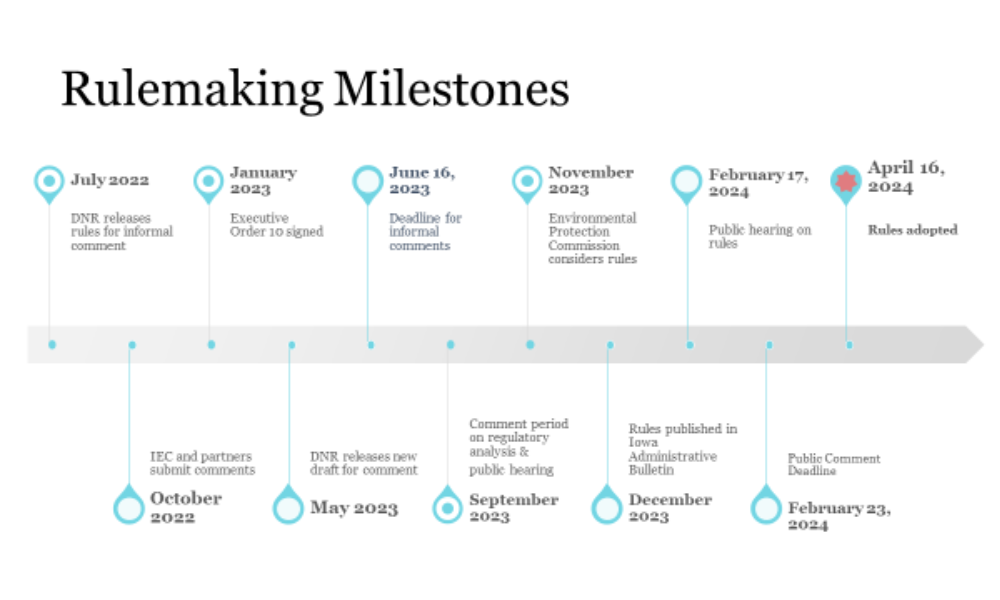When politics prevent water protections
posted
by Michael Schmidt on Friday, June 7, 2024
As a statewide organization, most of IEC’s work focuses on state actions – but sometimes, the state is unwilling to do what needs to be done. In April, the state Environmental Protection Commission adopted rules for animal feeding operations that did not include protections that DNR itself identified were necessary. In response, IEC filed a petition for emergency action under the Safe Drinking Water Act, asking EPA to step in and protect drinking water in northeast Iowa. We did not take this action lightly. It followed years of effort to convince the state to protect its residents from water pollution.
IEC has worked to prevent water pollution from concentrated animal feeding operations (CAFOs) in karst terrain for years. The effects in karst terrain are important because of the added risk there. It’s where limestone and other soluble rock can form sinkholes, caves, and fissures that connect surface water directly to groundwater. Just like exploring caves, the karst terrain brings risks: easy access to groundwater means the pollutants get in easily, too.

Following our efforts to stop Supreme Beef from operating a massive cattle feedlot in Clayton County, we argued to DNR that the department needed to do more to protect sensitive terrain. Following our petition for rulemaking to protect karst in 2021, DNR created an expert team to study karst terrain and make recommendations for CAFOs sited there. The team concluded that DNR needed to adopt stronger rules to prevent water pollution from CAFOs, and DNR started a rulemaking process.
Throughout the rulemaking process, IEC and our partners filed many sets of comments. We asked for some of the same things the karst team recommended – not building manure basins right on top of karst, for example. The DNR proposed rules that were not everything we asked for, but would be better than existing standards. We were hopeful that the petition might actually lead to stronger rules.
Unfortunately, politics got in the way. The DNR must submit rule changes to the governor’s office for “preclearance” – a pre-approval before proceeding. Unlike the pre-clearance process under the Voting Rights Act of 1965 (which required pre-clearance to prevent racially-driven gerrymandering), this process led the governor’s office to object to the stronger water protections for CAFO siting in karst. When DNR submitted weaker rules to the governor’s office, they received almost immediate approval to proceed.
At the Environmental Protection Commission meeting on April 16, IEC asked once again for stronger protections in karst. Alicia Vasto, IEC’s water program director, called on the Commission to listen to DNR’s own experts instead of the political influences that weakened the rules. The Environmental Protection Commission, once again, did not listen. It voted unanimously to adopt the weak rules that will not protect karst terrain.

Knowing that the EPC would likely approve the rules at that meeting, IEC and our partners looked at other options to try to protect drinking water sources in karst terrain. The Safe Drinking Water Act lets EPA intervene when two conditions are met: (1) contamination of underground sources of drinking water and (2) insufficient state action to stop the contamination. We petitioned EPA to intervene in Iowa by laying out the risks to drinking water sources in Northeast Iowa, highlighting the many wells that have tested above the 10 mg/L drinking water standard for nitrate in the Safe Drinking Water Act, and summarizing the state’s failure to act.
A similar petition in Minnesota, addressing nitrate contamination in karst terrain on the other side of the border, got results from EPA. EPA directed Minnesota’s state agencies to develop plans for providing clean water to Minnesota residents – both in the short term, by providing safe drinking water, and the long term, by addressing the sources of the contamination. Iowans deserve the same protections.
On June 13th, we are hosting two sessions in Northeast Iowa to talk with more Iowans in karst territory. We will be at the National Mississippi River Museum & Aquarium in Dubuque at noon, and the Strawberry Point Civic Center at 5:30 PM, where we will share information about the petition, answer questions, and hear from people who are directly affected. Please RSVP if you plan to attend!